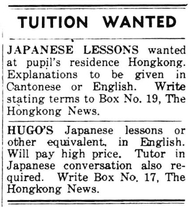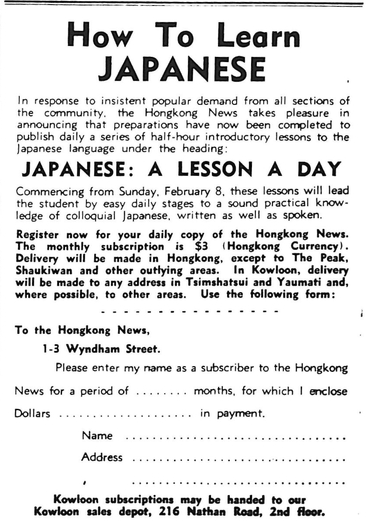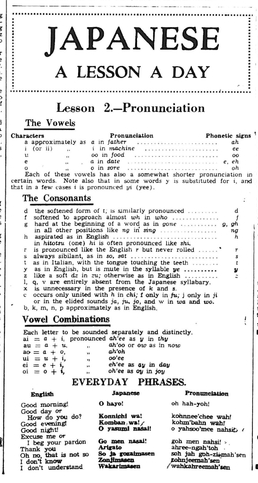[Below is the modified version of the newspaper column assignment submitted by Audrey Li, who was enrolled in “History of Hong Kong” (2018W). All rights reserved.]
Monday, 16 February 1942
A New Era of Education: Recovering Our Asian Culture
There is no worthier thing than pursuing an education, and for the reader who wishes to enjoy life in this new era of East Asian prosperity, the recent reforms of our educational system along with the dedicated work of The Hongkong News provide no better opportunity to learn and prepare one-self for the future.
Since the liberation of the city a little more than a month ago from the rule of the British, a great effort has begun to reform Hong Kong’s educational system and enable all its residents to share in the future of the city as a shining celebration of East Asian culture and strength. For too long, our ancient history and teachings have been neglected in our schools, and our children have been taught in the ways of the West, casting aside the old wisdom for Western indulgence. Do not be deceived into thinking that the British had our interests in mind when they brought their schools and their missionaries. This great city has been their gateway into China Proper, and by the indoctrination of its people, they have been plotting an invasion into the very heart of our ancestral homeland.
Consider the recent troubles of China, where agitators such as the rebel, Sun Yat-sen, overthrew the legitimate emperor, only to plunge the country into conflict and civil war. Some readers may recall this troublemaker’s visit to Hong Kong University in 1923, where he gave an address which openly bragged about the Westernized ways he learned in this city, ways which he took back to China and tried to impose by force. Shameless, he stood before our brightest young minds and declared that he had gotten his “revolutionary and model ideas” in Hong Kong (Sun Yat-sen, “Address to the Students of Hong Kong University,” p. 42). Sadly, this was not an idle boast.
It is not possible to overstate the harm which the imperialist schools have done. Though the teachings of the venerated Master Confucius gave strength to China through its long history, it is plain to see that both the understanding and practice of his lessons have vanished from Hong Kong. An article published in The Hongkong News on Sunday, February 8, spoke the truth when it declared that the British educational system has failed to produce Chinese scholars knowledgeable of their own culture, and that indeed, the great teacher Confucius is far better known in Japan, he whose teachings carried the might of the Chinese empire for so long. For even in our very highest institutions, the great scholars of the past would faint to see the poor study of their writings by our most accomplished youths.
We hear from reader H. K. Woo, who wrote in to The Hongkong News on Tuesday, February 10, of a speech by a Dr. Hu Shih in 1935 to the students of the University of Hong Kong, a speech in which that bold doctor declared that the Classics should not be read because the Chinese classical language was “too difficult” and “dead for all practical purposes” (“Readers’ Letters: Hongkong Education,” p. 3). Woo’s warning of the “moral and intellectual disintegration” that follows such disregard for the Classics is a lamentable truth (“Readers’ Letters,” p. 3). We Chinese of Hong Kong have forgotten our rich culture and history. Our language itself has been taken from us so that we cannot even study the great sages of the past: we are surrounded by English signs on the streets and even in matters of our own government, we have been forced to use the white man’s tongue.
Even that well-known collaborator, Robert Ho Tung, admitted as much when he wrote about the complete domination of the British schools on our children, from their earliest school years to the highest levels of study. He confessed that “[t]he Trimetrical Classics once learned by rote by the Chinese child have now given way to the standard spelling books and readers of the recognized Western schools” and that “a perfect revolution has been wrought on the moral and physical life of the Chinese by well-directed efforts for considerably more than half a century” (Sir Robert Ho Tung, Kt, “A sense of complacence, The Chinese in Hong Kong,” p. 112). And these are the words of a colonial sympathizer. Who can doubt what the British have done through their education, when even their allies recognize their heavy hand?
Education is the key to life and the key to a future. There is a reason why the British tried to brainwash our children in their imperial schools. They wished to create obedient servants that would labour for their empire, to control our lives while erasing our own Chinese culture. But even as they tried to mold us, we turned their own tools against them. We learned from them what was necessary to survive under their control, we learned how to recognize their ways and keep our culture alive, and now finally, we have made it through to liberation, and the freedom of an East Asia for East Asians.
We must now look to undoing the damage done by a hundred years of oppression. Despite their boasts of dominion, the British could not corrupt all of our children. Due credit must be given to those Chinese who contributed towards Chinese schools and Chinese education for our youth. Most commendable are the generous patrons such as those mentioned in a report only last year, who, seeing the high prices charged by those mainland schools that no poor family could hope to afford, set up charity schools so that no child would be denied their rightful education (“The out-break of war in China to 1941,” p. 212). Such an effort is worthy of praise.
Even greater work is now being done with the help of our allies to revive the teaching of the Classics and to open up cultural exchange in the new East Asia Co-prosperity Sphere. As The Hongkong News has been following over the past two weeks, training for new elementary school teachers who will educate our children in the cultures of both Japan and China has already begun. The new Teachers’ Training College has received hundreds of applications from both men and women in Hong Kong and Kowloon, and examinations have already distinguished 150 candidates who will study over the next two months not only general knowledge, but the Japanese language and affairs as well, in order to provide their students, our children, with a respectful understanding of our friends and allies (“Candidates Begin Studies At Teachers’ Training Institute,” p. 3).
Outside of schools, there is also a very great interest in learning the language of our liberators. In response to the great number of messages and advertisements that are sent to The Hongkong News every week inquiring about the services of a Japanese language tutor, the paper has just begun this past week to take on the duty of publishing short Japanese lessons for beginners in its daily issues, for readers who are unable to secure a place in a school or to engage a tutor. In this way, people of all ages can benefit from this new era of cultural exchange, an opportunity which is greatly encouraging. The chance to learn has been hard-won, but as this enthusiasm shows, its value is plain for all to see, and it can only be a benefit to everyone who takes this chance to be ready to meet whatever this brave new tomorrow has in store.
For many years, we have lived under the all-encompassing shadow of the British educational system, which made our city into a model and tool of the whites, and turned our minds away from the traditional teachings and morals which guided and strengthened our ancestors on the path of righteousness. With the liberation of Hong Kong from its white oppressors, a new order of prosperity and opportunity is beginning for the people of this city. The time is now. Will you choose to live in the future?
Tse Lun-Cheong is a Hong Kong-born Chinese teacher who was educated at the University of Hong Kong. He had taught for over 30 years at various charity schools and has recently taken up a position in the Civil Administration Department. He contributes to The Hongkong News as an education specialist.
[Bibliography withheld]


